Related Research Articles

Estelle Sylvia Pankhurst was an English campaigner for the suffrage and suffragette movement, a socialist and later a prominent left communist and activist in the cause of anti-fascism and the international auxiliary language movement. She spent much of her later life campaigning on behalf of Ethiopia, where she eventually settled.
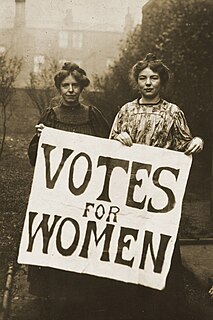
The Women's Social and Political Union (WSPU) was a women-only political movement and leading militant organisation campaigning for women's suffrage in the United Kingdom from 1903 to 1918. Known from 1906 as the suffragettes, its membership and policies were tightly controlled by Emmeline Pankhurst and her daughters Christabel and Sylvia.
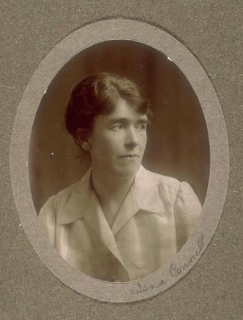
Rachel Barrett was a Welsh suffragette and newspaper editor born in Carmarthen. Educated at the University College of Wales in Aberystwyth she became a science teacher, but quit her job in 1906 on hearing Nellie Martel speak of women's suffrage, joined the Women's Social and Political Union (WSPU) and moved to London. In 1907 she became a WSPU organiser, and after Christabel Pankhurst fled to Paris, Barrett became joint organiser of the national WSPU campaign. In 1912, despite no journalistic background, she took charge of the new newspaper The Suffragette. Barrett was arrested on occasions for activities linked to the suffrage movement and in 1913–1914 spent some time incognito to avoid re-arrest.

Emmeline Pethick-Lawrence, Baroness Pethick-Lawrence was a British women's rights activist and suffragette.
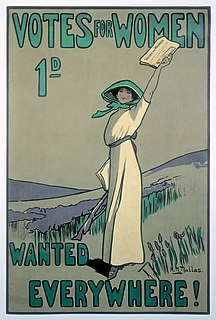
A movement to fight for women's right to vote in the United Kingdom finally succeeded through laws in 1918 and 1928. It became a national movement in the Victorian era. Women were not explicitly banned from voting in Great Britain until the Reform Act 1832 and the Municipal Corporations Act 1835. In 1872 the fight for women's suffrage became a national movement with the formation of the National Society for Women's Suffrage and later the more influential National Union of Women's Suffrage Societies (NUWSS). As well as in England, women's suffrage movements in Wales, Scotland and other parts of the United Kingdom gained momentum. The movements shifted sentiments in favour of woman suffrage by 1906. It was at this point that the militant campaign began with the formation of the Women's Social and Political Union (WSPU).

A suffragette was a member of an activist women's organisation in the early 20th century who, under the banner "Votes for Women", fought for the right to vote in public elections in the United Kingdom. The term refers in particular to members of the British Women's Social and Political Union (WSPU), a women-only movement founded in 1903 by Emmeline Pankhurst, which engaged in direct action and civil disobedience. In 1906, a reporter writing in the Daily Mail coined the term suffragette for the WSPU, derived from suffragist, in order to belittle the women advocating women's suffrage. The militants embraced the new name, even adopting it for use as the title of the newspaper published by the WSPU.

Aeta Adelaide Lamb was one of the longest serving organizers in the Women's Social and Political Union (WSPU), the leading militant organization campaigning for Women's suffrage in the United Kingdom.

Helen Miller Fraser, later Moyes, was a Scottish suffragist, feminist, educationalist and Liberal Party politician who later emigrated to Australia.
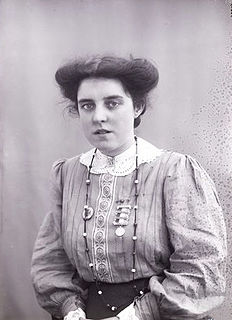
Theresa Garnett was a British suffragette. She was a serial protester who sometimes went by the name 'Annie O'Sullivan', was jailed and then still refused to cooperate. She assaulted Winston Churchill while carrying a whip. She retired from her militancy after the suffragette movement decided to commit arson as part of its protests. She was honorary editor of a women's right's magazine in 1960.

Charlotte "Charlie" Augusta Leopoldine Marsh was a militant British suffragette. She was a paid organiser of the Women's Social and Political Union and is one of the first women to be force fed during one of several terms of imprisonment for militant protest. She was chauffeur and mechanic to David Lloyd George during the First World War.

Mary Elizabeth Phillips was a suffragette, feminist and socialist. She was the longest prison serving suffragette. She worked for Christabel Pankhurst but was sacked; she then worked for Sylvia Pankhurst under name Mary Pederson. In later life she supported women's and children's organisations.

Mary Blathwayt was a British feminist, suffragette and social reformer. She lived at Eagle House in Somerset. This house became known as the "Suffragette's Rest" and contained a memorial to the protests of 60 suffragists and suffragettes. The memorial was bulldozed in the 1960s.

(Alice) Maud Arncliffe Sennett also known with the stage name of Mary Kingsley was an English actress and suffragist and a suffragette, arrested four times for her activism.

Florence Eliza Haig (1856–1952) was a Scottish artist and suffragette who was decorated for imprisonments and hunger strikes.

Lillian Dove-Willcox (1875–1963) was a British suffragette who was a member of Emmeline Pankhurst's personal bodyguard.
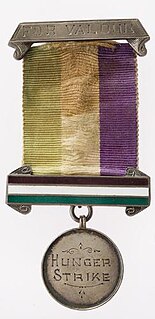
The Hunger Strike Medal was a silver medal awarded between August 1909 and 1914 to suffragette prisoners by the leadership of the Women's Social and Political Union (WSPU). During their imprisonment, they went on hunger strike while serving their sentences in the prisons of the United Kingdom for acts of militancy in their campaign for women's suffrage. Many women were force-fed and their individual medals were created to reflect this.
Patricia Woodlock, British artist and suffragette who was imprisoned seven times, including serving the longest suffragette prison sentence in 1908 ; she was awarded a Women's Social and Political Union (WSPU) Hunger Strike Medal for Valour. Woodlock's harsh sentence caused outrage among supporters and inspired others to join the protests, her release was celebrated in Liverpool and London and drawn as a dreadnaught warship, on the cover of the WSPU Votes for Women newsletter.
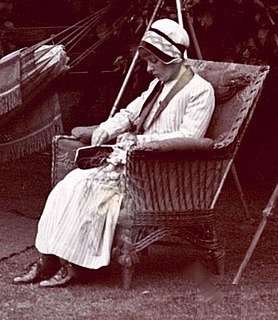
Florence Geraldine Macfarlane aka "Muriel Muir" was a nurse, militant suffragette and member of the Women's Social and Political Union (WSPU) who went on hunger strike in Winson Green Prison in Birmingham in 1912 and who was awarded the WSPU's Hunger Strike Medal.
Alice Morrissey was a British Catholic, socialist leader and suffragette activist from Liverpool, who was imprisoned in the campaign for women's right to vote.
"The Women's Marseillaise" was the former Women's Social and Political Union (WSPU) official anthem. It was sung to the tune of La Marseillaise and included words about women's suffrage written by Florence MacAulay. The song was sung by suffragists in both the United Kingdom and the United States.
References
- 1 2 3 "Florence E. M. Macaulay · Mapping Women's Suffrage". map.mappingwomenssuffrage.org.uk.
- 1 2 3 4 Crawford, Elizabeth (2 September 2003). The Women's Suffrage Movement: A Reference Guide 1866-1928. Routledge. ISBN 978-1-135-43401-4.
- 1 2 3 Cowman, Krista (15 July 2007). Women of the Right Spirit: Paid Organisers of the Women's Social and Political Union (WSPU), 1904-18. Manchester University Press. ISBN 978-0-7190-7002-0.
- 1 2 "Miss Florence Elizabeth Mary MacAulay / Database - Women's Suffrage Resources". www.suffrageresources.org.uk.